跨文化交际李成明unit2-A原文+翻译DOCX
跨文化交际李成明unit2-A原文+翻译PDF

Unit 2With the amazingly rapid development in transportation and information communication, people from different cultures interact more often than ever before, but misunderstandings even conflicts caused in the process of this interaction also grow increasingly. Just for this reason, much concern is focused upon the problem of how to help people interact and communicate successfully in a transcultural way. As a matter of fact, culture is not strange to us all. We hear, read and talk of it, such as Chinese culture, English culture, tea culture, campus culture and so on. But when it comes to the meaning of culture, it is notoriously difficult to define what culture really is or should be.随着交通运输和信息交流的飞速发展,不同文化背景下的人们交往越来越频繁,但在交往过程中产生的误会甚至冲突也日益增多。
正因为如此,人们关注的焦点是如何帮助人们以跨文化的方式成功地进行互动和交流。
事实上,文化对我们大家来说并不陌生。
我们听、读、谈它,如中国文化、英国文化、茶文化、校园文化等。
大学跨文化英语 综合教程I Unit 2 Overemphasis on Independence课文翻译

Reading & ReflectionOveremphasis on IndependenceEun Y. Kim1 During a vacation to Hawaii, my husband and I noticed an elderly man struggling to push a cartful of groceries. It was hot and humid, and he looked very tired and feeble.I was reminded of my father back in Korea.We cautiously approached the man and politely asked whether he needed any help. He responded rather angrily, “Do I look so weak that I can’t care for myself?” An American friend of mine had a similar experience. He went to a two-day business conference, and at the airport he ran into a woman who had attended the same conference. She was petite and was carrying heavy luggage, so he asked whether he could help her. She quite defensively and decisively stated, “I can do it myself.” Te guiding principle of many Americans is “I’ll do my thing, and you do yours.”2 Although I admire Americans’self-reliance and self-help attitude,their overemphasis on independence causes unnecessary fuss over basic issues, from how to raise a child to how to retire. As soon as my son was four months old, people suggested that he sleep in his own bedroom. They also suggested that I leave him alone at night and ignore him if he cried.In many families in Asia, young couples can afford only a one-bedroom residence. They don’t have the luxury of giving a baby their own room, and even if they do, most don’t want to leave their babies alone. It would be interesting to study whether babies learn to be independent because they are left alone in their own bedrooms and not given attention when they cry.3 From an Asian point of view, Americans’ individualism is an attempt to deny a natural social structure that exists among humankind. Some people who are obviously in need of help do not ask for it out of fear of being labeled as too dependent. A former professor who was suffering from cancer confessed that his biggest challenge was asking for help. He had been independent all his life. His children had an image of him as an independent man, and he didn’t want that to change. I can fully empathize with the man, because I used to be like him. But I came to learn that interdependence could enrich my life in serendipitous ways.4 My willingness to depend on others helped me make great friends.I could not afford a car in my early years of graduate school. Being independent, I tried to take city buses and school shuttles to go to church,to shop for groceries, or to attend meetings. Gradually when friends offered me a ride home, I began to take them up on their offers. Occasionally,I invited them over for homemade Korean meals, which they gladly accepted, giving us more opportunities to develop a friendship. In this way,we slowly became close friends.5 Willingness to accept others’ help can also benefit those who offer the help. Mary White, a sociologist at Boston University, states that allowing ourselves to be nurtured confers value on the caretaker by giving that person an opportunity to display the valued skill of nurturing. Besides,people who give help become more interested in the people they help.Even within a family, interdependence brings family members closer together, whereas independence can create a sense of self-righteousness and distance. Also, independent people tend to be less sympathetic toward those who need help. InAfrica, there is a saying that men become men through other men.6 In international business, letting go of pride and asking for help can improve negotiations. One of the mistakes Americans make in negotiating with Asians is that they often present themselves as proud and strong who can do anything. They act as if they can survive and conquer alone. But if they were willing to let go of some of their independence, they could develop allies instead of enemies. An American lawyer who lived and worked in Japan said that when he shared his worry about specific contract terms and conditions with the Japanese, many of them were more than willing to help him. Another American businessman talked about reaching a deadlock in a negotiation session with some Korean partners. When the two sides took a break, he said to one of his Korean partners, “You hold my destiny in your hand.” And he meant it. After the break, the Korean negotiators were much more gentle and agreeable, and he learnt that sharing his feelings was his best negotiation strategy.7 Admitting that we need help does not mean admitting weakness.Rather it displays the strength to acknowledge that we need the resources around us. As an Asian saying goes, “If you share your happiness, it will be doubled. If you share your unhappiness, it will be halved.”参考译文过分强调独立金恩英在夏威夷度假期间,我和我丈夫注意到一位年长的男士正费力地推着满满的一车货物。
大学生跨文化交际U2Pa课文翻译定稿2014

Unit 2 Passage A1. 中国的核心价值与儒家思想有关,儒家思想的道德准则是对人际关系中道德品质的总结,孔子就用它来夫妇有别,长幼有序,朋友有信。
”在两千多年的封建统治时期,统治阶级用这五伦来处理每件事,这就形成了一个分级的社会,即臣忠于君,子孝于亲的社会。
2. 在英国文艺复兴时期,人们开始强调人的尊严以及现实生活的重要性。
他们提倡人不仅有享受美好生活的权利,更要具备完善自己和创造奇迹的能力。
这就是人文主义的基本理念。
自那以后,人们开始尊重人性,随即有发展出了我们今日称之为“自由”的思想,即民主。
3. 以美国为例,优秀的个人价值观就是独立、努力以及生活成功、个人成就与乐于助人三方面实现平衡。
就社会价值观而言,美国人在这6方面领先:言论自由、个人自由、个人权利、公开争论、独立思考和。
而中国的价值观则提倡努力工作、尊重学习、诚实守信、独立自由和持久忍耐。
亚洲人值得推崇的6个社会价值观是社会有序、和谐一致、政府问责、开拓思路、言论自由和尊重权威。
4. 与美国人不同的是,东亚人通常更尊重权威,赞誉社会有序,可与他们一致的是亚洲人也尊重新观念,政府问责及言论自由。
5. 中西方文化的不同与个人主义和集体主体文化密不可分。
6. 个人主义就是人们注重个体、强调个体需要。
一般来说,西方文化倾向于个人主义。
7. 集体主义文化即把自身当作是集体(家庭、单位、部落、国家)的一员,一般认为集体的需要高于个体。
大多数亚洲文化,包括中国在内,倾向于集体主义。
8.个人主义是指在一个社会里个人权利是首要的。
大多数西方人士认为每个人都有自己独立的身份和人格,这应该得到认可并强化。
因此,如果不理解个人主义,则无法理解西方的文化和西方人。
唯有理解了个人主义,我们才能明白西方人对家庭、友谊和隐私的看法。
个人主义的核心是追求个人利益和成就,作为一项社会的基本品质,它被高度地重视,并被人们真心铭记和认真领会。
9. 在基督教的传统文化中,个人主义不但对彼此重要,而且对社会对上帝都重要。
跨文化交际-其他要点翻译
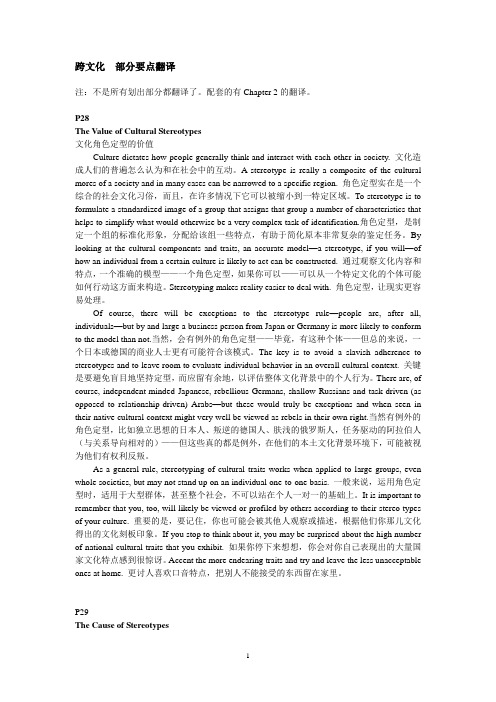
跨文化部分要点翻译注:不是所有划出部分都翻译了。
配套的有Chapter 2的翻译。
P28The Value of Cultural Stereotypes文化角色定型的价值Culture dictates how people generally think and interact with each other in society.文化造成人们的普遍怎么认为和在社会中的互动。
A stereotype is really a composite of the cultural mores of a society and in many cases can be narrowed to a specific region.角色定型实在是一个综合的社会文化习俗,而且,在许多情况下它可以被缩小到一特定区域。
To stereotype is to formulate a standardized image of a group that assigns that group a number of characteristics that helps to simplify what would otherwise be a very complex task of identification.角色定型,是制定一个组的标准化形象,分配给该组一些特点,有助于简化原本非常复杂的鉴定任务。
By looking at the cultural components and traits, an accurate model—a stereotype, if you will—of how an individual from a certain culture is likely to act can be constructed.通过观察文化内容和特点,一个准确的模型——一个角色定型,如果你可以——可以从一个特定文化的个体可能如何行动这方面来构造。
【VIP专享】跨文化交际 unit1~6 课后translation中英对照

Unit 1 Page 22The growth of intercultural communication as a field of study is based on a view o f history that clearly demonstrates people and cultures have been troubled by a pers istent inability to understand and get along with groups and societies removed by sp ace, ideology, appearance, and behavior from their own. What is intriguing about m any of human civilization's failure is that they appear to be personal as well as globa l. The story of humankind is punctuated with instances of face-to-face conflicts as well as international misunderstanding--major and minor quarrels that range from simple name-calling to isolationism or even armed conflict.It is obvious that increased contact with other cultures and subcultures makes it i mperative for us to make a concerted effort to get along with and to try to understa nd people whose beliefs and backgrounds may be vastly different from our own. Th e ability, through increased awareness and understanding, to peacefully coexist with people who do not necessarily share our lifestyles or values could benefit us not only in our own neighborhoods but could be the decisive factor in maintaining world pea ce.纵观历史,我们可以清楚地看到,人们由于彼此所处地域、意识形态、容貌服饰和行为举止上存在的差异,而长久无法互相理解、无法和睦相处。
新编跨文化交际英语1-10课后翻译

Unit 2 Page 60Unit 3 Page 96Unit 5 Page 175Unit 6 Page 2158Translation如果接受这样的信念,认为以往的存在状况影响着我们对现实的看法,并且接受相应的原则,认为每个人都有着相似的但又不完全一样的个人经历,那么,随之就得到这样的结论:另一个人对宇宙的描述不一定会和我们对宇宙的描述完全一样。
然而,我们大多数人似乎仍认为我们自己感知事物的方法是唯一正确的。
我们常常忽略感知的差异,并且断定,如果一个人不知道巴比罗•毕加索是有史以来最伟大的艺术家,他简直就不懂艺术。
实际上,他很可能有着不同的经历,对他来说,什么是伟大的艺术跟我们对于艺术的感知或许并不一致。
在我们的日常活动中,感知差异常常出现在不同的群体之间。
不同年代的人、不同少数民族、不同职业和不同文化有着相冲突的价值观念和目标,这些都影响着他们对于现实的感知和解释。
我们的文化是导致感知不一致的主要因素。
文化影响着我们对于现实看法的形成。
因此,它在跨文化交际中起着一种主导作用。
我们的文化以各种方式告诉我们,怎样去判断别人,使用什么标准去做判断。
这样评价的危险在于它们常常是不真实的,武断的并导致误解的。
相信并在行为中表现出仿佛只有我们和我们的文化才发现了最真实而且是唯一的标准,对世界持这样的看法是极其天真幼稚的。
9Translation身处异域文化的人们总会面临着这样一个问题,即为了适应当地人的信仰、价值观、准则和社会规范,到底需要在多大程度上改变自己的行为举止呢?在交往中谁有责任把文化差异考虑在内?是应该让来访者、新来的人或旅居者调整自己的行为以适应当地文化,还是让当地人改变交流方式,从而为初来乍到的人们提供便利?人们必须多大程度地改变自己文化的信仰、价值观、准则和社会行为来以适应主导文化的模式呢?俗话说“入乡随俗”,很明显,这让改变的重任落在了新来者的身上。
话虽很有道理,但并不能适用于所有情况。
跨文化交际中英文化对比课文参考译文U2

第二单元服饰和着装规范Section A 中国服饰Passage 1 中国传统服装1中国传统服饰是中国文化的重要组成部分,因为其历史反映了中国古代经济、政治、文化在不同历史阶段的变化。
2中国传统服装主要有两种款式:上衣下裳制和衣裳连属制。
上衣下裳制作为最早的服装式样可以追溯到黄帝时期。
这种服装是由上装“衣”和男女通用的下装“裳”组成的。
上衣下裳式服装流行于夏、商、周时期,其特点是左包右。
西周统治者以家族为基础,建立了以血缘和伦理规范为纽带的严格的等级制度。
正如这一时期出现的深衣和冕服所示,为了突出自己的特权,他们以服饰作为身份的象征。
3在春秋和战国时期,服装发生了很大的变化。
由于配有大腰带的宽松的服装已经不能跟上时代的步伐,服装界掀起了一场大变革。
为了提高部队的战斗力,赵武陵王提倡胡服。
胡服是由几件衣服组合而成的全套服装。
4一体式的袍是秦汉时期非常推崇的发款式。
秦朝规定三品及以上的官员穿绿袍和深衣,而普通人穿白袍。
在汉代,虽然深衣在汉人中间仍然很流行,但袍发挥着大礼服的作用。
汉服是从商朝的冕服演变而来的,随着宽袖的引入引入,汉服变得更加松散,还配有挂在腰带上的玉佩,以保持衣的合拢。
一套完整的汉服是由几件衣服组合而成的:衣(男女都可以穿的任何交领衣服)、袍(男性穿的任何封闭的全身衣)、襦(一种敞开的交领衫)、衫(一种敞开的交领衫或罩在衣之外的上衣)、裙或裳(一种中性裙子)和裤(裤子)。
5中国古代服饰的第二次大变化发生在魏晋南北朝时期。
原因是战事频频,款式稍有不同的胡服成为最常见的服装,其特点是袖子窄,衣贴身,裳开叉。
6隋唐时期,政治稳定,经济繁荣,是服装设计和款式发展的黄金时代,中外文化交流空前。
一套男性常服由幞头(软帽)或帽(硬帽)、罩衫和靴子组成的。
罩衫与裳稍有不同,圆领、无卷边窄袖,是胡服与汉服的完美结合。
唐代女性的服饰比前朝更为宽松和暴露,图案繁多。
7在理学的影响下,宋代的衣服在色彩上趋于保守,而袍逐渐被褙子取代。
跨文化交际_Unit_2_参考翻译

跨文化交际_Unit_2_参考翻译Unit Two Task 11)A smooth sea never made a skillful mariner. 平静的大海决不能造就出熟练的水手。
/花盆里生长不出参天大树。
/温室里长不出栋梁之才。
2)He who would search for pearls must dive below.不入虎穴,焉得虎子。
/ 欲寻珍珠就要潜到水里。
/ 欲寻珍珠欲潜入水。
3)Living without an aim is like sailing without a compass. 生活没有目标如同航行没有罗盘。
/没有目标的生活如同没有罗盘的航行。
4)To have another fish to fry另有要事/ 另有事情得做5)The water that bears the boat is the same that swallows it up.水能载舟,亦能覆舟。
(The same knife cuts bread and fingers.)6)前人栽树,后人乘凉。
One sows and another reaps. / One man sows and another reaps. / One generation plants the trees in whose shade another generation rests. / The precedence planted, the later generations enjoy its cool.7)斩草不除根,逢春又发青。
If the grass is only cut, then the next spring it will revive. / Cut weeds and dig up the roots.8)种田不用问,深耕多上粪。
Planting has no better measures but ploughing deeply and fertilizing much more.9)生米煮成熟饭。
跨文化交际英语阅读教程unit02课后翻译

Checking Is Believing参考译文:验证为实网络随时在拓展,它几乎可以给大多数学科提供无限量的信息。
除了提供大量信息之外,网络使用起来也方便快捷。
如今,我们拥有很多设备它们可以联网并展示信息,即使当你在赶路时也是如此。
因此,网络可以提供一个获取信息的方便途径,而且网络已经受到了学生们的极力推崇。
如果一位学生有条件上网,那么他/她就没有必要去图书馆查找资料。
这样不仅节省了大量的时间也省去了交通费。
几乎可以这样说,学生们比上班族有更多的时间浏览网页,网络上提供的信息有助于他们完成学习任务,这一点成了他们上网的额外动机。
Reading BThis freedom is, of course, in sharp contrast to traditional media. Publishing companies, for example, can be very selective about their authors. Such companies have high standards and will only publish a book if the author is well qualified and experienced in the subject area. Publishers get other experts to review a book before it is printed and further improvements to the book are made by editors and book designers employed by the publishing companies. Editors frequently make suggestions to make the book longer or shorter and to improvethe au thor’s use of language to make the writing clearer and more easily comprehensible to readers. Designers handle the layout of a book, including the cover, photographs and other graphics and even the font type and style of the text.参考译文:网络提供的这种自由和传统的媒介相比当然有着明显的区别。
【免费下载】跨文化交际 unit1~6 课后translation中英对照

Unit 1 Page 22The growth of intercultural communication as a field of study is based on a view o f history that clearly demonstrates people and cultures have been troubled by a pers istent inability to understand and get along with groups and societies removed by sp ace, ideology, appearance, and behavior from their own. What is intriguing about m any of human civilization's failure is that they appear to be personal as well as globa l. The story of humankind is punctuated with instances of face-to-face conflicts as well as international misunderstanding--major and minor quarrels that range from simple name-calling to isolationism or even armed conflict.It is obvious that increased contact with other cultures and subcultures makes it i mperative for us to make a concerted effort to get along with and to try to understa nd people whose beliefs and backgrounds may be vastly different from our own. Th e ability, through increased awareness and understanding, to peacefully coexist with people who do not necessarily share our lifestyles or values could benefit us not only in our own neighborhoods but could be the decisive factor in maintaining world pea ce.纵观历史,我们可以清楚地看到,人们由于彼此所处地域、意识形态、容貌服饰和行为举止上存在的差异,而长久无法互相理解、无法和睦相处。
跨文化商务交际Unit 2 课文1参考译文(彭炳铭)
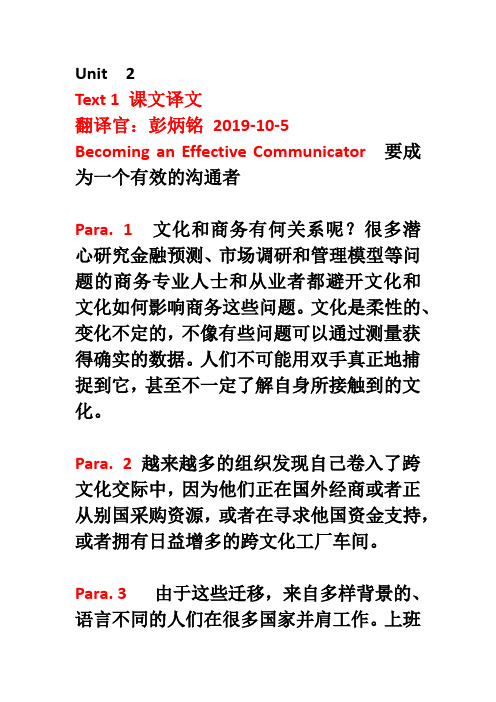
Unit 2Text 1 课文译文翻译官:彭炳铭2019-10-5Becoming an Effective Communicator 要成为一个有效的沟通者Para. 1 文化和商务有何关系呢?很多潜心研究金融预测、市场调研和管理模型等问题的商务专业人士和从业者都避开文化和文化如何影响商务这些问题。
文化是柔性的、变化不定的,不像有些问题可以通过测量获得确实的数据。
人们不可能用双手真正地捕捉到它,甚至不一定了解自身所接触到的文化。
Para. 2 越来越多的组织发现自己卷入了跨文化交际中,因为他们正在国外经商或者正从别国采购资源,或者在寻求他国资金支持,或者拥有日益增多的跨文化工厂车间。
Para. 3由于这些迁移,来自多样背景的、语言不同的人们在很多国家并肩工作。
上班时的跨文化沟通不再是遥远未来的目标,而是眼下此时此刻必需的事情。
Para. 4 跨文化沟通能力被广泛地认为是一个人在既定环境里其行为是否恰当和有效的一种印象。
通常工作能力被认为是一种熟练的行为能力。
Para. 5 恰当(appropriateness)就意味着不能违反那些关系中重要的规则、行为规范和期望。
效能(effectiveness)是指相对于成本和替代物而言的重要目标的实现或报酬的获得。
有了这两个标准,在跨文化环境中的沟通才是令人满意的。
只有那些既恰当又有效的国际商人才能达到跨文化最佳商务沟通者的标准要求。
下面例子将说明恰当与效能的区别。
布赖恩.霍尔兹(Brian Holtz)是一个美国商人,被公司派到泰国做公司的办公室主任。
塔里先生(Thani)是公司泰国曼谷分部的重要的副经理,最近上班总是迟到。
霍尔兹不得不决定如何处理这一问题。
经过深思熟虑,他有四种策略:(1)私下找塔里问缘由并告诉他上班要准时;(2)忽略这个问题不管;(3)下次再迟到就公开训斥他;(4)私下讨论时,建议说自己在帮他找一个助理来处理其部下上班迟到的问题,并征求他的意见:如何处理。
跨文化交际(UNIT 2)
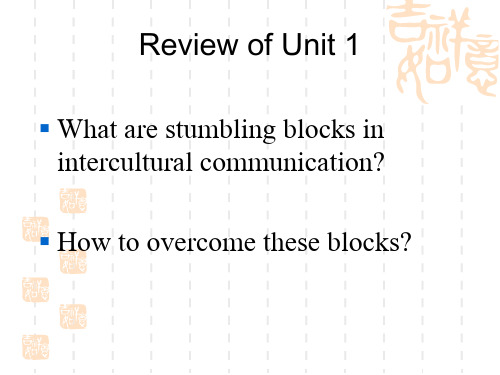
Supplement: What is culture?
It may include the following components: ①Materials man has got to satisfy his needs, including science and technology, such as space shuttles, airplanes, and cars; ②Social institutions and organizations man has established, including socioeconomic institutions, politico-legal institutions, and religious organizations; ③Knowledge about nature and man himself and artistic development, including various subjects such as mathematics and education, and artistic forms such as literature, painting, music and dance; ④Language and other communication systems such as gestures and facial expressions; ⑤Customs, habits and behavioral patterns; ⑥Value systems, world views, national traits, aesthetic standards and thinking patterns.
Reading I
Read the article of ―What Is Culture‖ (p3943). What can you learn about culture from it? Please answer the questions followed: 1. Which of the definitions given above do you prefer? Why? 2. What have you learned from those definitions about culture? 3. Do you agree that our lower needs always have to be satisfied before we can try to satisfy the higher needs?
跨文化交际unit课后translation中英对照
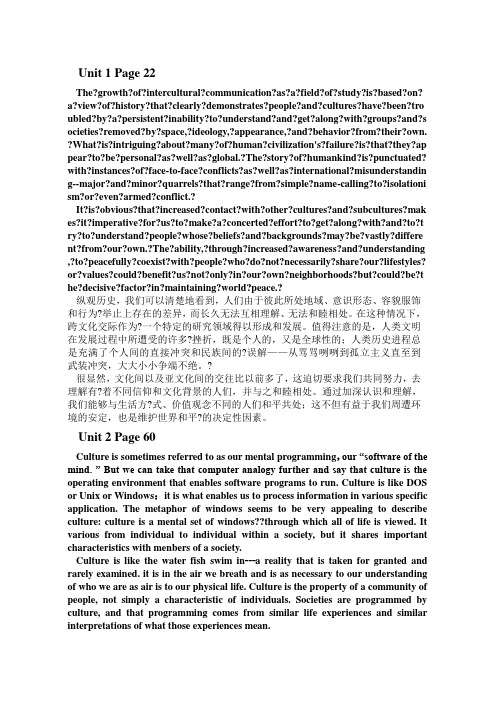
Unit 1 Page 22The?growth?of?intercultural?communication?as?a?field?of?study?is?based?on? a?view?of?history?that?clearly?demonstrates?people?and?cultures?have?been?tro ubled?by?a?persistent?inability?to?understand?and?get?along?with?groups?and?s ocieties?removed?by?space,?ideology,?appearance,?and?behavior?from?their?own. ?What?is?intriguing?about?many?of?human?civilization's?failure?is?that?they?ap pear?to?be?personal?as?well?as?global.?The?story?of?humankind?is?punctuated? with?instances?of?face-to-face?conflicts?as?well?as?international?misunderstandin g--major?and?minor?quarrels?that?range?from?simple?name-calling?to?isolationi sm?or?even?armed?conflict.?It?is?obvious?that?increased?contact?with?other?cultures?and?subcultures?mak es?it?imperative?for?us?to?make?a?concerted?effort?to?get?along?with?and?to?t ry?to?understand?people?whose?beliefs?and?backgrounds?may?be?vastly?differe nt?from?our?own.?The?ability,?through?increased?awareness?and?understanding ,?to?peacefully?coexist?with?people?who?do?not?necessarily?share?our?lifestyles? or?values?could?benefit?us?not?only?in?our?own?neighborhoods?but?could?be?t he?decisive?factor?in?maintaining?world?peace.?纵观历史,我们可以清楚地看到,人们由于彼此所处地域、意识形态、容貌服饰和行为?举止上存在的差异,而长久无法互相理解、无法和睦相处。
跨文化交际课文翻译

Speaki ng Englis h with a Japane se mind 日本人在达到上学年龄后就要学英语,这些人在学会英语之后就可能用英语进行对外交流,但是他们所使用的英语要受到他们本民族的语言和文化的影响。
因此这就会造成困扰和误解在与其他用英语的人交流时。
AM,当他作为索尼公司的首席执行官时,在一次给美国的商学会做报告时他指出了这两种语言的明显差异。
他举了一个例子,一个美国商人向他的一个日本生意上的伙伴提议了一项计划。
可是当美国人完成时,日本人才开始谈论这个项目听起来多么有趣并且他们公司也有同样的想法。
美国人认为这个项目肯定会被接受。
但是随着辩论的拖延,美国人的关注也开始减弱,然后日本人说,不管怎样。
AM告诫说,接下来就是你要仔细听的时候了。
因为真正的回答是在那个词语的后面。
他经常告诫他的部下官员要用一种大多数的使用英语的人都习惯的方式说话,如果他想被别人理解。
他还告诫说,在日本你可能是大多数,但是到了国外你就是一小部分。
要想用一种大多数人都能最大限度的理解你的方式说话需要更多的语法知识和大量的词汇。
你必须对你所谈话的那个人的交流方式,社交礼仪,价值观等等很熟悉。
日本人的说话顺序正好和说英语的人相反。
甚至就是一个非常简单的句子,比如英国人会说,你得带伞因为要下雨。
而日本人会说,因为会下雨所以你要带伞。
不管这种正常的表达方式的顺序是否会控制想法顺序还是什么,日本人这种用不同顺序的表达信息的方式会让那些说英语的国家的人且对日本语言不了解的人感到困惑。
另一个例子就是,一些说英语的日本人和美国的一些领导举行卫星电视会议来讨论两国间的经济和贸易关系。
日本的参会者说着流利的英语,同时会被翻译成日语以供那些不懂得英语的人理解。
新编跨文化交际英语教程1~7单元翻译
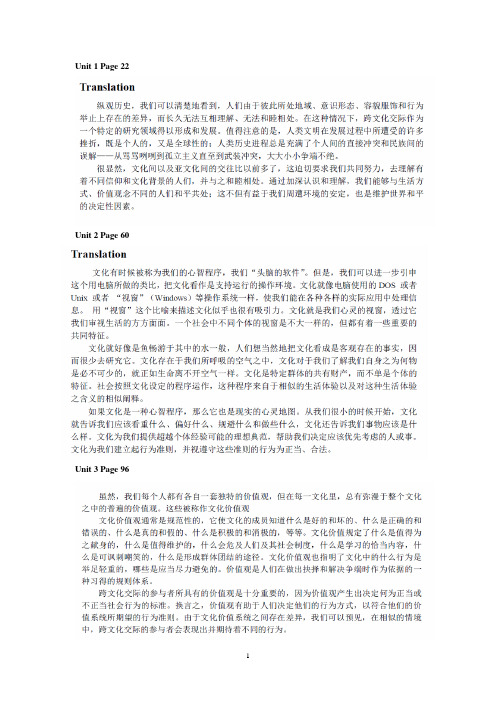
Unit 2 Page 60 Unit 3 Page 96Unit 5 Page 175 Unit 6 Page 215Case 2A common cultural misunderstanding in classes involves conflicts between what is said to be direct communication style and indirect communication style. In American culture, people tend to say what is on their minds and to mean what they say. Therefore, students in class are expected to ask questions when they need clarification. Mexican culture shares this preference of style with American culture in some situations, and that‘s why the students from Mexico readily adopted the techniques of asking questions in class. However, Korean people generally prefer indirect communication style, and therefore they tend to not say what is on their minds and to rely more on implications and inference, so as to be polite and respectful and avoid losing face through any improper verbal behavior. As is mentioned in the case, to many Koreans, numerous questions would show a disrespect for the teacher, and would also reflect that the student has not studied hard enough.Case 3The conflict here is a difference in cultural values and beliefs. In the beginning, Mary didn’t realize that her Dominican sister saw her as a member of the family, literally. In the Dominican view, family possessions are shared by everyone of the family. Luz was acting as most Dominican sisters would do in borrowing without asking every time. Once Mary understood that there was a different way of looking at this, she would become more accepting. However, she might still experience the same frustration when this happened again. She had to find ways to cope with her own emotional cultural reaction as well as her practical problem (the batteries running out).Case 6When a speaker says something to a hearer, there are at least three kinds ofmeanings involved: utterance meaning, speaker’s meaning and hearer’s meaning. In the dialogue, when Litz said ‘How long is she going to stay?’ she meant to say that if she knew how long her mother-in-law was going to stay in Finland, she would be able to make proper arrangements for her, such as taking her out to do some sightseeing. However, her mother-in-law overheard the conversation, and took Litz’s question to mean “Litz does not want me to stay for long”. From the Chinese point of view, it seems to be inappropriate for Litz to ask such a question just two days after her mother-in-law’s arrival. If she feels she has to ask the question, it would be better to ask some time later and she should not let her mother-in-law hear it.Case 7Keiko insists on giving valuable gifts to her college friends, because in countries like Japan, exchanging gifts is a strongly rooted social tradition. Should you receive a gift, and don’t have one to offer in return, you will probably create a crisis. If not as serious as a crisis, one who doesn’t offer a gift in return may be considered rude or impolite. Therefore, in Japan, gifts are a symbolic way to show appreciation, respect, gratitude and further relationship.Keiko obviously has taken those used items from Mary, Ed and Marion as gifts, for she probably doesn’t know that Americans frequently donate their used household items to church or to the community. Mary, Ed and Marion would never consider those used household items given to Keiko as gifts. No wonder they felt very uncomfortable when they received valuable gifts in return.Case 10In Japan, a company is often very much like a big family, in which the manger(s) will take good care of the employees and the employees are expected to devote themselves to the development of the company and, if it is necessary, to sacrifice their own individual interests for the interests of the company, from which, in the long run, the employees will benefit greatly. But for the French, a company is just a loosely- knit social organization wherein individuals are supposed to take care of themselves and their families. Moreover, the way the French make decisions in the family might also be different from the typical Japanese one, which may not often involve females and the power to decide usually lies with the dominating male. As there are such cultural differences between the Japanese and the French, Mr. Legrand’s decision made Mr. Tanaka feel dumbfounded.Case 12In this case, it seems that the Chinese expectations were not fulfilled. First, having two people sharing host responsibilities could be somewhat confusing to the hierarchically minded Chinese. Second, because age is often viewed as an indication of seniority, the Chinese might have considered the youth of their Canadian hosts as slight to their own status. Third, in China, it is traditional for the host to offer a welcome toast at the beginning of the meal, which is the reciprocated by the guests; by not doing so, the Canadian might be thought rude. The abrupt departure of the Chinese following the banquet was probably an indication that they were not pleased with the way they were treated. The Canadians’ lack of understanding of the Chinese culture and the Chinese ways of communication clearly cost them in their business dealings with the visiting delegation.Case 17When these two men separate, they may leave each other with very different impressions.Mr Richardson is very pleased to have made the acquaintance of Mr Chu and feels they have gotten off to a very good start. They have established their relationship on a first-name basis and Mr Chu’s smile seemed to indicate that he will be friendly and easy to do business with. Mr Richardson is particularly pleased that he had treated Mr Chu with respect for his Chinese background by calling him Hon-fai rather than using the western name, David, which seemed to him an unnecessary imposition of western culture.In contrast, Mr Chu feels quite uncomfortable with Mr Richardson. He feels it will be difficult to work with him, and that Mr Richardson might be rather insensitive to cultural differences. He is particularly bothered that, instead of calling him David or Mr Chu, Mr Richardson used his given name, Hon-fai, the name rarely used by anyone, in fact. It was this embarrassment which caused him to smile. He would feel more comfortable if they called each other Mr Chu and Mr Richardson. Nevertheless, when he was away at school in North America he learned that Americans feel uncomfortable calling people Mr for any extended period of time. His solution was to adopt a western name. He chose David for use in such situations.Case 19Talking about what’s wrong is not easy for people in any culture, but people in high-context countries like China put high priority on keeping harmony, preventing anyone from losing face, and nurturing the relationship. It seems that Ron Kelly had to learn a different way of sending message when he was in China. At home in Canada he would have gone directly to the point. But in China, going directly to the problem with someone may suggest that he or she has failed to live up to his or her responsibility and the honor of his or her organization is in question. In high-context cultures like China, such a message is serious and damaging. In low-context cultures, however, the tendency is just to “spit it out”, to get it into words and worry about the result later. Senders of unwelcome messages use objective facts, assuming, as with persuasion, that facts are neutral, instrumental, and impersonal. Indirectness is often the way members of high-context cultures choose to communicate about a problem. Case 21Sometimes our best intentions can lead to breakdowns (故障)in cross-cultural communication. For example, one of the very common manners of touching --- handshaking --- may result in conflict when performed with no consideration of cultural differences. Among middle-class North American men, it is customary to shake hands as a gesture of friendship. When wanting to communicate extra friendliness, a male in the United States may, while shaking hands, grasp with his left hand his friend’s right arm. However, to people of Middle Eastern countries, the left hand is profane (亵渎的) and touching someone with it is highly offensive. Therefore, in Vernon’s eyes, Kenneth was actually an extremely offensive message to him. Case 22In Puerto Rican culture, as in some other Latin American and Eastern cultures, it is not right for a child to keep an eye-contact with an adult who is accusing him or her, while in the United States, failing of meeting other person’s eye accusing him or her would be taken as a sign of guiltiness. As the principal knew little about this cultural difference in using eye-contact, he decided that the girl must be guilty. Generallyspeaking, avoiding eye-contact with the other(s) is often considered as an insult in some cultures, but may signify respect for authority and obedience in other cultures. Case 25For people from the American culture and western European cultures, one’s time should be scheduled into segments or compartments which are to be kept discrete from one another. They prefer to do one thing at a time. They will be annoyed when they have made an appointment with somebody, only to find a lot of other things going on at the same time. They don’t like to interrupt others and be interrupted by other while they are doing something. In contrast, people from many other cultures including the Chinese culture are more likely to operate with several people, ideas, or matters simultaneously. They are more easily distracted and subject to interruptions, which they would not usually mind very much. The miscommunication between Katherine and the director can be ascribed to their lack of knowledge about each other’s way of using time.In this case, to the Chinese director as well as many other Chinese people, it is natural to handle the other things which needed to be dealt with immediately. He may have thought that, in this way, he utilized the time best. But to Katherine and most Westerners, it’s quite different. They tend to do things strictly according to their schedule and appointments with others, which is their concept of using time best.高语境交流和低语境交流(由高到低排列)Japanese, Chinese, Korean, African American, Native American, Arab, Greek, Latin,Italian,English,Frech,Amercian,Scandinavian,German,German-Swiss。
Unit 2 Text A课文翻译

Unit 2 Text A人文学科:过时了吗?1 当形势变得困难时,强者会去选学会计。
当就业市场恶化时,许多学生估算着他们不能再主修英语或历史。
他们得学一些能改善他们就业前景的东西。
2 数据显示,随着学生肩负的学费不断增加,他们已从学习人文学科转向他们相信有益于将来就业的应用科学和“硬”技能。
换言之,大学教育越来越被看成是改善经济而不是提升人类自身的手段。
这种趋势可能会持续,甚至有加快之势。
3 在未来几年内,由于劳动力市场的不景气,人文学科可能会继续其长期低迷的态势。
在上一代大学生中,主修文科的学生数跌幅已近50%。
这种趋势会持续、甚至加速的想法是合情合理的。
人文学科曾是大学生活的重要支柱,而今在学生们的大学游中却只是一个小点缀。
现在,实验室要比图书馆更栩栩如生、受人青睐。
4 在这儿,请允许我为人文学科给人们的生活所增添的真实价值进行支持和宣传。
自古以来,人们一直在思索人类自身具有什么神奇的内力使一些人变得崇高伟大,而使另一些人走向自我毁灭。
几个世纪以来,这股内力被称作很多东西。
著名的心理学家西格蒙德•弗洛伊德称之为“潜意识”,或更为人熟知的“本能”。
5 从一开始,人类这股可以是建设性也可以是毁灭性的内在驱动力,就令我们心驰神往。
这些惊人的、充满内心挣扎的故事形成了世界文化的基础。
历史学家、建筑师、作家、哲学家和艺术家们以故事、音乐、神话、绘画、建筑、雕刻、风景画和传统的形式,捕捉到了这些撞击心灵的文字、形象及内涵。
这些男男女女创造出了具有艺术性的“语言”,帮助我们了解人类的这些强烈愿望,并用以教育一代又一代人。
从古时起开始的这些充满想象的大量作品,正是文明的底蕴,它奠定了人文研究的基础。
6 学习人文学科会提高我们的阅读和写作能力。
无论我们这一生中从事什么职业,如果我们能读懂复杂的思想并理解它们的内涵,我们都会受益匪浅。
如果我们是在办公室里能对这些思想写出既明确又简洁的分析的人,我们会有光明的职业前景。
- 1、下载文档前请自行甄别文档内容的完整性,平台不提供额外的编辑、内容补充、找答案等附加服务。
- 2、"仅部分预览"的文档,不可在线预览部分如存在完整性等问题,可反馈申请退款(可完整预览的文档不适用该条件!)。
- 3、如文档侵犯您的权益,请联系客服反馈,我们会尽快为您处理(人工客服工作时间:9:00-18:30)。
Unit 2With the amazingly rapid development in transportation and information communication, people from different cultures interact more often than ever before, but misunderstandings even conflicts caused in the process of this interaction also grow increasingly. Just for this reason, much concern is focused upon the problem of how to help people interact and communicate successfully in a transcultural way. As a matter of fact, culture is not strange to us all. We hear, read and talk of it, such as Chinese culture, English culture, tea culture, campus culture and so on. But when it comes to the meaning of culture, it is notoriously difficult to define what culture really is or should be.随着交通运输和信息交流的飞速发展,不同文化背景下的人们交往越来越频繁,但在交往过程中产生的误会甚至冲突也日益增多。
正因为如此,人们关注的焦点是如何帮助人们以跨文化的方式成功地进行互动和交流。
事实上,文化对我们大家来说并不陌生。
我们听、读、谈它,如中国文化、英国文化、茶文化、校园文化等。
但说到文化的意义,很难界定什么是真正的文化,什么应该是文化。
Text A The Concept of CultureCulture is notoriously difficult to define. In 1952, the American anthropologist, Alfred Kroeber and Clyde Kluckhohn, critically reviewed concepts and definitions of culture, and compiled a list of 164 different definitions. So far there is no agreement among anthropologists and scholars regarding the nature of culture.众所周知,文化很难定义。
1952年,美国植物学家阿尔弗雷德·克罗伯和克莱德·克鲁克汉对文化的概念和定义进行了批判性的重新审视,并编制了164个不同的定义清单。
到目前为止,人类学家和学者对于文化的本质还没有达成一致意见。
Although the term culture is used by most of the social sciences today, over the years it has received its most precise and thorough definition from the discipline of anthropology. Whereas sociology has concentrated on the notion of society; economics on the concepts of production, distribution, and consumption; political science on the concept of power; anthropology has focused on the culture concept. From anthropology nineteenth-century beginnings, culture has been central to both ethnology and archaeology and has been an important, if not major, concern of physical anthropology. Anthropology, through its constant examining of different life ways throughout space and time, has done more than any other scientific discipline to refine our understanding of the concept of culture.尽管今天大多数社会科学都使用“文化”这个词,但多年来,它从人类学学科中得到了最精确、最彻底的定义。
而社会学则集中于社会概念;经济学则集中于生产、分配和消费概念;政治学则集中于权力概念;人类学则集中于文化概念。
从19世纪的人类学开始,文化就一直是民族学和考古学的中心,并且一直是一个重要的,如果不是主要的,对物质人类学的关注。
人类学通过对整个空间和时间中不同生活方式的不断研究,比任何其他科学学科都更能完善我们对文化概念的理解。
In nonscientific usage, the term culture refers to personal refinements such as classical music, the fine arts ,world philosophy and gourmet cuisine. For example,according to this popular use of the term, the cultured person listens to Bach rather than Eminem, can distinguish between theartistic styles of Monet and Toulouse-Lautrec,and attends the ballet instead of professional wrestling. The anthropologist, however, uses the term in a broader sense to include far more than just "the finer things in life". The anthropologist does not distinguish between cultured people and uncultured people. All people have culture, according to the anthropological definition. The Australian aborigines, living with a bare minimum of technology, are as much cultural animals as Yo-yo Ma and Baryshnikov. Thus, for the anthropologist, projectile points, creation myths and mud huts are as legitimate items of culture as a Beethoven symphony, a Warhol painting and a Sondheim musical.在非科学的用法中,文化一词是指个人的改进,如古典音乐、美术、世界哲学和美食。
例如,根据这个流行的术语,有文化的人听巴赫而不是埃米纳姆,可以区分莫奈和图卢兹·劳特里克的艺术风格,参加芭蕾舞而不是职业摔跤。
然而,人类学家在更广泛的意义上使用这个术语,不仅包括“生活中更美好的事物”。
人类学家不区分有文化的人和没有文化的人。
根据人类学的定义,所有人都有文化。
澳大利亚原住民生活在科技含量最低的地方,他们和马友友和巴利什尼科夫一样是文化动物。
因此,对于人类学家来说,投射点、创造神话和泥屋与贝多芬交响乐、沃霍尔绘画和桑德海姆音乐剧一样,都是合法的文化项目。
Over the past century, anthropologists have formulated a number of definitions of the concept of culture. In fact, in the often-cited work by Alfred Kroeber and Clyde Kluckhohn, more than 160 different definitions of culture were identified. This should not lead to the conclusion that anthropology is a chaotic battle ground where no consensus exists among practicing anthropologists. In actuality, many of these definitions say essentially the same thing. One early definition was suggested by nineteenth-century British anthropologist Edward Tylor. According to Tylor, culture is "that complex whole which includes knowledge, belief, art, morals, law, custom, and any other capabilities and habits acquired by man as a member of society". More recently, culture has been defined as "a mental map which guides us in our relations to our surroundings and to other people", and perhaps most succinctly as "the way of life of a people".在过去的一个世纪里,人类学家对文化概念提出了许多定义。
